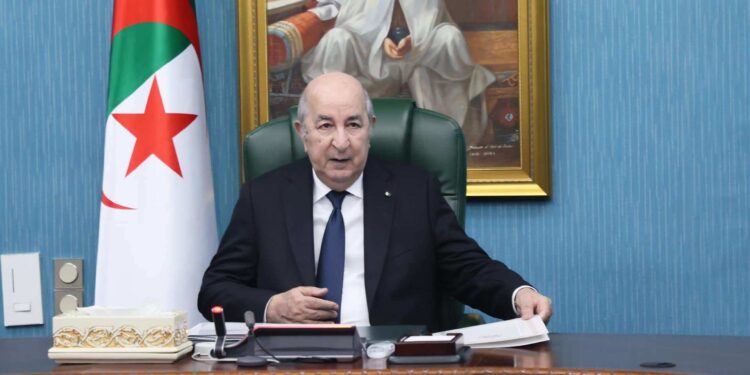Algerian President Abdelmadjid Tebboune is counting on winning a second term in the September 7 elections, armed with an improvement in the country’s social and economic situation, but after five years of the movement, hopes for profound political change have faded.
Tebboune announced his candidacy for a second presidential term on July 11, saying, “I believe that everything we have done was a foundation and a first building block for making our economy an emerging economy in the full sense of the word,” stressing that he seeks to build a “new Algeria” over the next five years.
Abdelmadjid Tebboune was elected in late 2019 in a vote that took place at the height of the popular movement and saw a high abstention rate of 60%. He had to confront the peaceful protest movements that toppled his predecessor Abdelaziz Bouteflika in April of the same year after mass demonstrations.
“If the political issue is not resolved legitimately, any economic, cultural, diplomatic or other discourse will be just a distraction,” says political science professor Mohammed Hannad.
economic power
President Tebboune believes that he has “put the country back on the right track in response to the needs of the people and to make Algeria an economic powerhouse.” He does not miss an opportunity to recall Bouteflika’s last two terms, which he described as the “decade of the gang,” referring to the president’s entourage, who has been weakened by illness since suffering a stroke in 2013.
After Bouteflika’s fall, the courts issued heavy sentences against former ministers, directors of public companies, and individuals from the former president’s entourage.
In addition to the “big clean-up” process in the previous authority pyramid, Tebboune believes that he has redirected the economy towards the right path, and said, “The indicators prove the strength of the national economy currently,” referring to “the increase in state revenues, the halt of the bleeding of the public treasury, and the recovery of billions of dollars in looted funds.”
In Abidi’s opinion, Tebboune benefited from “favorable international conditions,” such as the war in Ukraine since February 2022, which increased the prices of natural gas, of which Algeria is the largest exporter in Africa, and also from his “deep knowledge of how the Algerian administration works.”
He explains that Tebboune has introduced “new ways of governing that are now geared towards the social and material needs of the population.”
Slow changes
Since 2022, there have been signs of improvement. At the end of July/In July, Tebboune forecast growth of 4.2% this year (after more than 4% the previous year), a GDP of $260 billion and foreign exchange reserves estimated at $70 billion.
But the economy remains undiversified and heavily dependent on energy, with oil and gas exports providing 95% of foreign exchange earnings.
On the foreign policy front, Tebboune’s performance has also been mixed, with Algeria returning to the international stage by hosting the Arab League summit in 2022 and occupying a non-permanent seat on the UN Security Council where it champions the Palestinian cause. However, it has seen relations deteriorate with several Arab and African neighbours such as Morocco, the UAE and Mali, and tensions with former colonial power France.



